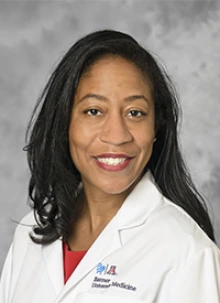Health Disparities in Advanced Heart Failure Treatment – Intersection of Race and Sex
Sarver Heart team led by Khadijah Breathett looking into gender and racial bias found doctors more judgmental on women’s appearance and social support networks, particularly African American women.
TUCSON, Ariz. – Physicians revealed biases affecting women, particularly African American women, when evaluating heart failure patients for advanced heart disease therapies such as heart transplants and ventricular assist devices (VADs), according to recently published research led by the Sarver Heart Center at the University of Arizona Health Sciences.

Khadijah Breathett, MD (left), meets with members of her research team, including Natalie Pool, PhD, RN (on screen), Ashley Larson, Janice D. Crist, PhD, RN, and Erika Yee. (Photo: Katie Maass/University of Arizona Sarver Heart Center)
Investigators also found during interviews that, regardless of race or gender, final recommendations made for allocation of advanced therapies favored VADs over transplants. These were among the conclusions in the qualitative study, “Association of Gender and Race with Allocation of Advanced Heart Failure Therapies,” which appeared July 21 in JAMA Network Open.
“We know that, despite higher rates of heart failure among African Americans and women overall, these populations are less likely to receive advanced heart failure therapies,” said Khadijah Breathett, MD, MS, assistant professor of medicine at the UArizona College of Medicine – Tucson. Dr. Breathett is a board-certified advanced heart disease and transplant cardiologist.
Among U.S. members of an international heart transplantation organization, a qualitative study was performed using a “think-aloud” interview technique and supplemental surveys. The goal was to understand how gender and race influence clinician decision-making for heart transplantation and ventricular assist devices.
Participants were randomized to an identical patient vignette, or case history, varying only by patient race and gender. The research team asked participants to share their thoughts out loud and analyzed responses to identify themes that guide decision making.
Allocation themes included:
- Judging women’s appearance more harshly in forming an overall impression
- Believing African American men had more severe illness than white men
- Believing African American women had less appropriate care compared to white women
- Believing similar forms of social support where adequate for men and inadequate for women.
“Participating clinicians believed that women patients were required to be the primary caregivers for children, and their spouses were not capable of being adequate caregivers,” Dr. Breathett said. “This was particularly true for African American women. However, men were perceived as having adequate caregiver support, and therefore likely to have more successful outcomes after receiving an advanced therapy,” Dr. Breathett said.

Khadijah Breathett, MD
The allocation process is subjective and at risk for bias, she acknowledged. Nevertheless, women represent less than a quarter of recipients of heart transplants and ventricular assist devices in the United States. This study reveals how bias may contribute to delays in care and to the inequitable allocation of advanced therapies nationally.
The disparities and biases identified in the Dr. Breathett-led article were reiterated in an accompanying editorial in JAMA Network Open, “Health Disparities in Advanced Heart Failure Treatment – The Intersection of Race,” by Bessie A. Young, MD, MPH, a nephrologist and associate chair for diversity and inclusion with the University of Washington, and section head at the VA Puget Sound Health Care System and investigator with its Center of Innovation for Veteran-Centered and Value-Driven Care in Seattle.
Referring to Dr. Breathett’s research, Dr. Young noted some biases seemed to be present in participants from both majority and minority racial groups, which implied clinicians may be taught certain biases that are internalized regardless of their race. However, with the very limited nature of cardiac transplants as a resource, she said, “Lack of referral for cardiac transplantation may in fact be a death sentence for those with terminal heart failure.”

Click to view paper.
Dr. Young recommended a patient-centered approach to evaluation and allocation of VAD and organ transplantation. “Lay personnel could be added to the transplantation evaluation panel, similar to the approach that the Patient-Centered Outcomes Research Institute takes with evaluation of grants,” she added. “Additionally, transplantation review teams should be well versed in implicit bias and required to take the Implicit Association Test as well as undergo implicit bias and antiracist training.”
Other UArizona authors on the study include: Nancy K. Sweitzer, MD, PhD, Erika Yee, and Ryan Yee, from Sarver Heart Center; Natalie Pool, PhD, RN, Janice D. Crist, PhD, RN, and Marilyn McEwen, PhD, RN, College of Nursing; Shannon M. Knapp, PhD, Statistics Consulting Lab, UArizona Health Sciences and BIO5 Institute; Sade Solala, MD, Department of Medicine; Kathryn Herrera-Theut, College of Medicine – Tucson; Jeff Stone, PhD, Department of Psychology; and Elizabeth Calhoun, PhD, MEd, Center for Population Health Sciences.
Additional authors include: Megan Hebdon, PhD, DNP, RN, University of Utah, Salt Lake City; Luis Luy, University of Rochester; and Leanne Zabala, MD, University of California, Los Angeles.
This research was supported by multiple funding sources including: National Heart, Lung, and Blood Institute (NHLBI) Award No. K01HL142848 and NHLBI 2R25HL126146-05 Subaward 11692sc; a UArizona Health Sciences, Strategic Priorities Faculty Initiative Grant, and UArizona Sarver Heart Center Women of Color Heart Health Education Committee. Additional support was received from the National Institutes of Health under Award Nos. T32NR013456 and R25HL108837.
# # #
NOTE: Photos available upon request.
About the Sarver Heart Center
The University of Arizona Sarver Heart Center's 160 members include faculty from cardiology, cardiothoracic surgery, pediatric cardiology, neurology, vascular surgery, radiology, endocrinology, emergency medicine, nursing, pharmacy and basic sciences. The UArizona Sarver Heart Center emphasizes a highly collaborative research environment, fostering innovative translational or "bench-to-bedside" research; dedicated to innovating lifesaving patient care. If you would like to give permission for Sarver Heart Center to contact you about heart research studies, please complete a Cardiology Research Registry Information Form. The academic mission of the Sarver Heart Center encompasses four fellowship programs in cardiovascular disease, interventional cardiology, advanced heart failure and transplant cardiology, and electrophysiology. For more information: heart.arizona.edu (Follow us: Facebook | Twitter | Instagram | YouTube).
About the University of Arizona Health Sciences
The University of Arizona Health Sciences is the statewide leader in biomedical research and health professions training. UArizona Health Sciences includes the Colleges of Medicine (Tucson and Phoenix), Nursing, Pharmacy, and the Mel and Enid Zuckerman College of Public Health, with main campus locations in Tucson and the Phoenix Biomedical Campus in downtown Phoenix. From these vantage points, Health Sciences reaches across the state of Arizona, the greater Southwest and around the world to provide next-generation education, research and outreach. A major economic engine, Health Sciences employs nearly 5,000 people, has approximately 4,000 students and 900 faculty members, and garners $200 million in research grants and contracts annually. For more information: uahs.arizona.edu (Follow us: Facebook | Twitter | YouTube | LinkedIn | Instagram).

